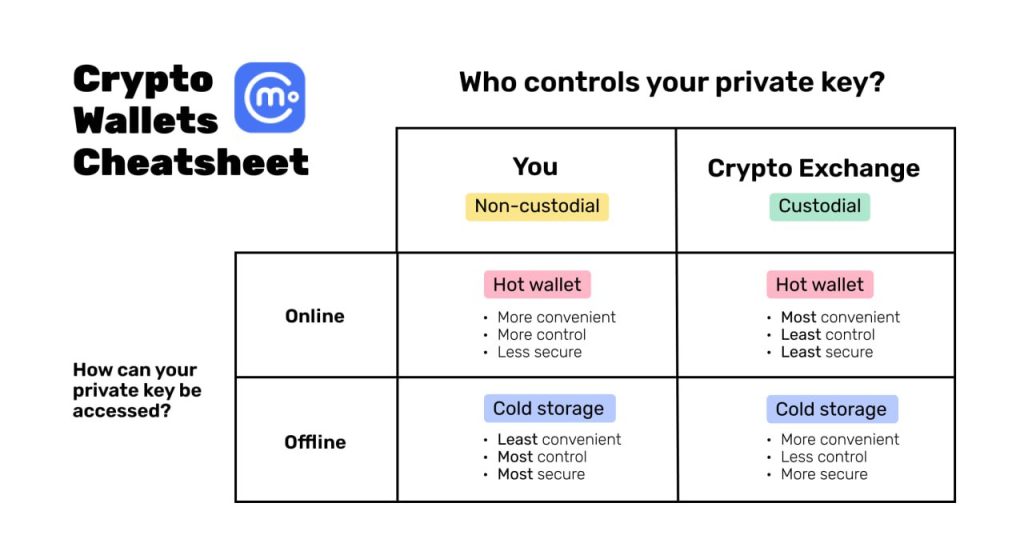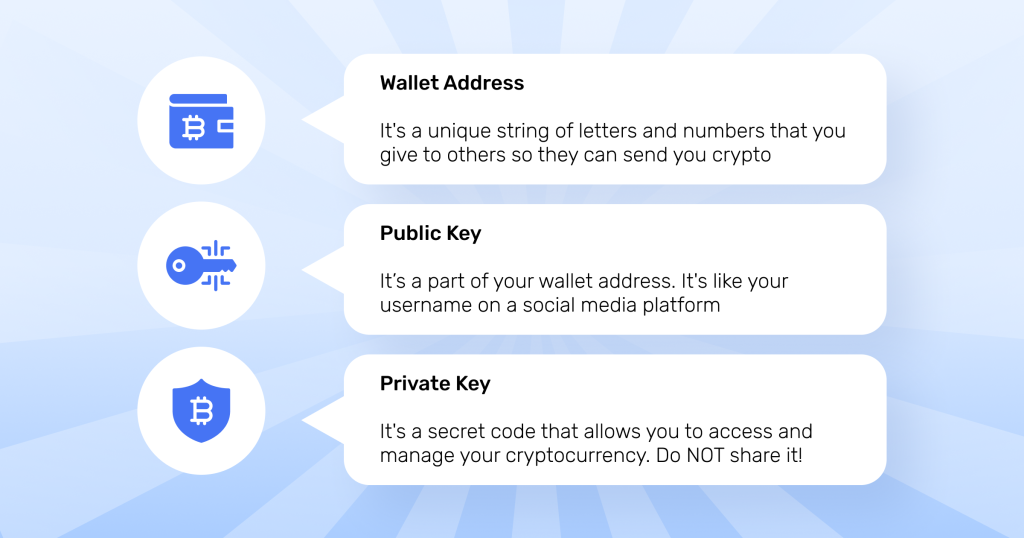Crypto Wallets: Your Essential Guide to Secure Trading
Jane Savitskaya


A crypto wallet is like your digital piggy bank for your cryptocurrencies. It’s a place where you can store, send, and receive digital coins like Bitcoin or Ethereum. Just like a regular wallet holds your cash and cards, a crypto wallet holds your digital money securely on the internet.
The first-ever crypto wallet belonged to Satoshi Nakamoto, the mysterious creator of Bitcoin.
Fun fact: Hal Finney received the first-ever Bitcoin transaction (10 BTC) from Nakamoto in 2009! And that’s how all this crypto craze began!
A crypto wallet has a public key (kind of like a wallet’s address) and private keys (super-secret codes for making transactions). We’ll talk about those a bit later.
Gentle reminder: Keep those private keys, well, private.
There are different types of wallets, like custodial and noncustodial, software, hardware, and even paper wallets. They each have their own quirks and safety levels.
What is a seed phrase?
When you create a crypto wallet, they give you a list of 12 to 24 special words. These words are like a secret key to your wallet. It’s not just the words themselves but also their order that’s crucial.
This list of special words, in the right order, is what they call your ‘seed phrase’. It’s your wallet’s secret code to keep your coins safe.
Please, DO NOT take screenshots or send it in messages, especially on Android. If a hacker gets access to your phone’s data, your crypto funds could be in grave danger.
Types of crypto wallets
Now, wallets are like two big categories: custodial and noncustodial.
- Custodial wallets? They’re like a fancy hotel for your crypto, run by others. These folks look after your keys. You’ll find these with some exchanges.
- Noncustodial? That’s like having your own fortress for your crypto. You’re the keymaster, and it’s your responsibility to keep those keys safe. Most wallets on your devices are like this.
But wait, there’s more! Wallets also come in hot and cold varieties.

Hot wallets are online or linked to the internet, while cold wallets are offline.
We know, it might sound a bit tricky, but here’s the deal: the more control you want, the colder you go.
A noncustodial cold storage wallet? Super secure but less convenient. A custodial hot wallet? Easy-peasy but less control. It’s all about finding what suits you best.
And there are different types too —software, hardware, and paper. Each of them can be either hot or cold.
Software Wallets
These are like your trusty phone apps or computer programs. They store your private keys online. You’ll find them in desktop, mobile, and web versions. (Example: Coinbase Wallet)
Hardware Wallets
Think of these as mini vaults! Hardware wallets are compact devices, a bit like USB drives. They keep your private keys far from the online world, adding a fortress of security. However, they can be a bit tricky to use and are pricier.
Paper Wallets
Yes, you read that right! A paper wallet is literally a piece of paper with your crypto keys written or printed on it.
It’s as old-school as it sounds, and some find it secure.
Cool story: in 2013, James Howells, a software engineer from Wales, lost his hardware wallet with $186.9 million worth of Bitcoin. He mistakenly threw away (!) in a landfill.
For nine years, he’s been on a mission to find that fateful hard drive. His plan? To use AI scanning and a robotic arm to search through a landfill site. Wishing James the best of luck in his search!
Which type of crypto wallet should you choose?
Well, it depends on your preferences across 3 dimensions: convenience, security & control.
If you’re looking for convenience, a hot wallet might be your best bet. These are apps you can download to your smartphone, making it easy to access your crypto on the go. They’re great for everyday transactions and quick access to your funds.
For those prioritizing security, a hardware wallet is the way to go. These physical devices store your private keys offline, keeping them safe from online threats like hackers and malware. It’s like having a digital safe for your crypto.
If you value control and want to manage your own keys, a desktop or software wallet might be more suitable. These wallets give you full control over your private keys, allowing you to access your funds anytime, anywhere.
Most popular crypto wallets
There’s a wide variety of various crypto wallets out there, ranging from big names to smaller platforms.
Here are some examples of the most popular crypto wallets:
Coinbase Wallet — great for beginners
MetaMask — awesome for Ethereum lovers
TrustWallet — perfect for mobile users
Electrum — tops for desktop Bitcoin storage
BlueWallet — go-to mobile Bitcoin wallet
Exodus — fantastic for desktop users
Crypto. com — rocking the world of DeFi
How to create a crypto wallet?
So, you’ve done your research and finally decided to create your crypto wallet. Ready to dive in?
Follow these simple steps to get started!
- Choose your wallet. Start by downloading a non-custodial mobile wallet. Options like Trust Wallet, Exodus, or Coinbase Wallet are user-friendly and great for newbies.
- Secure your backup. Your seed phrase is your wallet’s BFF. Learn how to back it up and restore it. This is your lifeline to your crypto.
- Dip your toes in. Head to a centralized exchange (CEX) like Binance or Coinbase and buy a small amount of coins. Your newly acquired crypto will be held in a web wallet provided by the exchange.
- Back your mobile wallet. Time to flex those crypto muscles. Transfer your crypto from the web wallet to your non-custodial mobile wallet. This step empowers you to have more control and security over your assets.
You’ve got this! It might seem like a lot at first, but take it step by step, and you’ll soon be a pro at handling your digital riches.
Crypto exchange vs crypto wallet
A crypto wallet is not the same as a crypto exchange. They’re like cousins: similar but different. Seasoned traders often prefer wallets for more control over their crypto.
A crypto exchange is a platform where you can buy, sell, and trade cryptocurrencies. It’s like a digital marketplace where you can exchange one type of cryptocurrency for another or for fiat currency like dollars or euros.
On the other hand, a crypto wallet is a digital tool that allows you to store and manage your cryptocurrencies. It’s like a virtual safe where you keep your digital coins safe and secure.
While some exchanges offer wallet services, it’s generally safer to store your crypto in a separate wallet that you control. If your exchange gets attacked by hackers, you could permanently lose your crypto, even though your passwords and private keys are safe.
What are public keys, private keys, and wallet addresses?

Understanding addresses, public keys, and private keys is essential for grasping the mechanics of cryptocurrencies.
Wallet Address
A wallet address is like your crypto email address. It’s a unique string of letters and numbers that you give to others so they can send you cryptocurrency. Think of it as your digital mailbox.
Public Key
Your public key is part of your wallet address. It’s like your username on a social media platform. You share it with others so they can send you crypto. However, it’s safe to share because it only allows people to send you funds; they can’t access your wallet.
Private Key
Your private key is like the password to your wallet. It’s a secret code that allows you to access and manage your cryptocurrency. You should never share your private key with anyone else, as it gives full control over your funds. Keep it safe and never share it with anyone.
Tips on keeping your crypto wallet safe
Keeping your crypto safe is crucial. It’s your money we’re talking about — security is paramount in these matters.
So, here are some easy-to-follow tips to help you fortify your wallet and ensure your peace of mind.
1. Guard your keys. Keep your private keys safe and never share them.
2. Activate 2FA. Add an extra layer of security with two-factor authentication.
3. Choose strong passwords. Pick tough passwords with a mix of characters.
4. Watch out for scams. Stay alert for phishing tricks and shady links.
5. Update regularly. Keep your wallet software fresh for top-notch security.
Wrapping up
In conclusion, remember that your crypto wallet is like a digital safe for your assets. By choosing the right type of wallet, understanding how to keep it secure, and practicing smart habits, you can safeguard your investments.
So, whether you’re storing a little or a lot, keep these tips in mind and enjoy the world of crypto with confidence!





